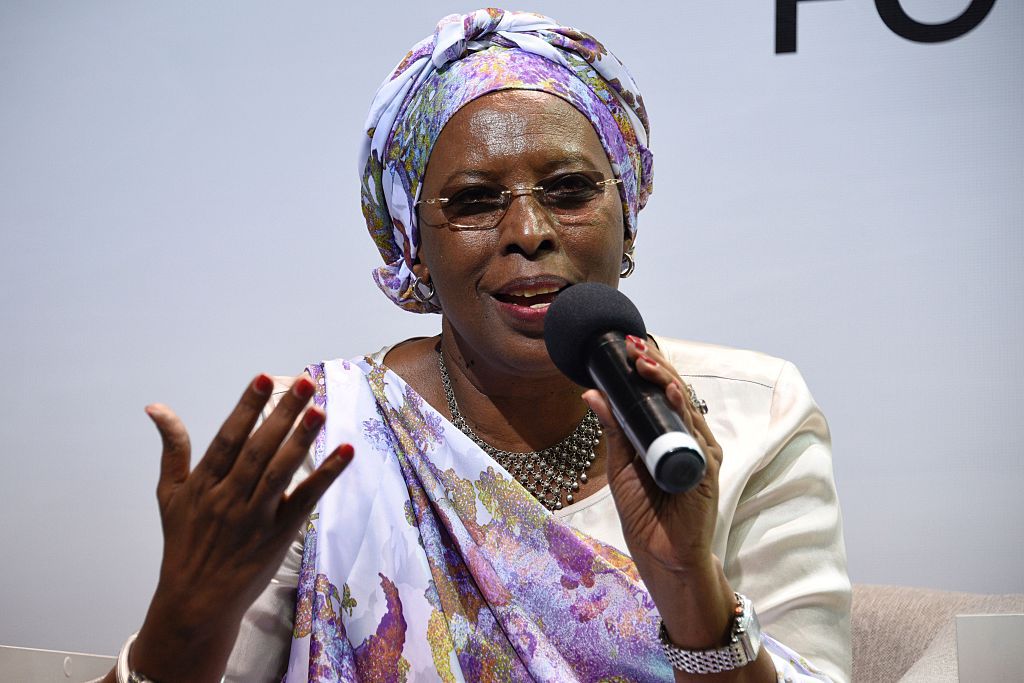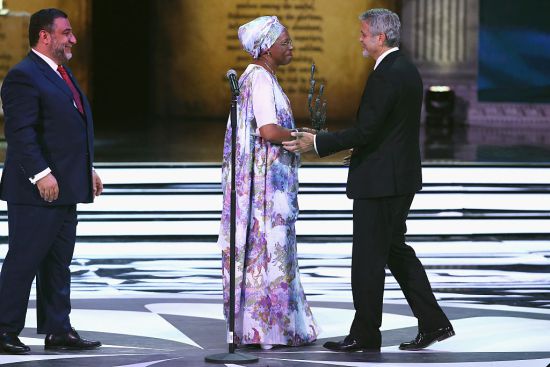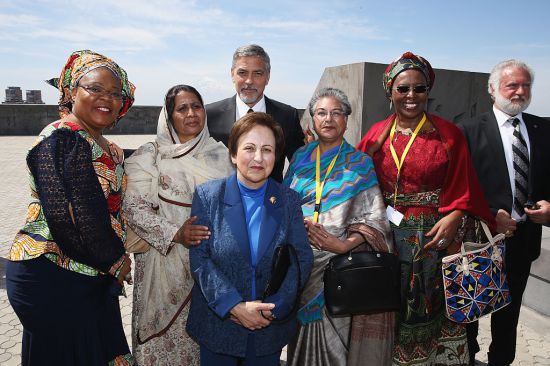After rescuing 20,000 Burundian orphans, Marguerite Barankitse forges on in exile
August 8, 2016
“I am only a mother who wanted to educate generations of young people to break this cycle of violence. I will carry on, no one can stop love.”

MARGUERITE BARANKITSE WAS NAMED THE INAUGURAL LAUREATE OF THE AURORA PRIZE FOR AWAKENING HUMANITY, ON APRIL 24, 2016. (KAREN MINASYAN/AFP/GETTY IMAGES)
She has been called the “Angel of Burundi”, compared to Mandela and Mother Teresa, and received a prestigious prize from the hands of George Clooney earlier this year, yet Marguerite Barankitse insists she is not a hero. “I am only a mother, caring for her children,” she contends.
The Aurora Prize aims to recognize exceptional humanitarian work being carried out in conflict-ridden regions of the world. As the first Aurora Prize Laureate, Barankitse received a $100,000 grant, plus a $1 million award to distribute to other organizations that inspired her work.
Founded in 1994 in Burundi, at the height of a civil war pitting Hutus against Tutsis, Barankitse’s organisation Maison Shalom has rescued more than 20,000 orphans, regardless of their ethnic origins — a feat that could have cost her her life, but instead earned her locally the nickname of “Maggy the Madwoman.”
There could be said to be a certain madness to her vision — the sort of madness required to achieve greatness and change. In a country where ethnic politics have profoundly divided people, Maggy — she still favors the nickname — has been teaching values of peace and fraternity to the surviving children who came to her, telling them to look beyond labels such as “Hutu” or “Tutsi” and instead embrace their common humanity. “That is my folly, to refuse fatality, to refuse indifference. And for that people find me disturbing because I breakdown the mould through which they see the world,” she told Women in the World.

YEREVAN, ARMENIA – APRIL 24: Aurora Prize Co-Founder Ruben Vardanyan, Aurora Prize finalist and Founder Maison Shalom, Marguerite Barankitse and Aurora Prize Selection Committee Co-Chair George Clooney on April 24, 2016 in Yerevan, Armenia. (Photo by Andreas Rentz/Getty Images for 100 Lives)
Aurora Prize Co-Founder Ruben Vardanya (L), Marguerite Barankitse (C) and Aurora Prize Selection Committee Co-Chair George Clooney (R) in Yerevan, Armenia. (Andreas Rentz/Getty Images for 100 Lives)
Her self-assigned mission to raise Burundi’s next “generation of peace” has been part of a larger process of reconciliation following the civil war. Unlike neighboring Rwanda where discussing ethnic backgrounds is now unlawful, Burundi decided against turning it into a taboo. “We never hid anything. The children knew their ethnic origins, so we talked about it and we reconciled,” Barankitse said. “The children, with their own sense of humor, started writing ‘Welcome to the home of the Hutsitwacongozungu,’ their own ethnicity, encompassing all others.”
Teaching reconciliation however did not mean a simple, rosy path of sweet neologisms and child’s play. It often involved painful experiences as children would go back to visit their villages and encounter their parents’ murderers. “I told them that we could not replace justice, that vengeance is useless and that our role is to seek forgiveness, to live together,” Barankitse explained.
That work brutally came to an end a year ago. With president Pierre Nkurunziza’s announcement he would run for an unconstitutional third term in April 2015, Burundi has been sinking back into its worst crisis since the end of the civil war in 2005. As young people took to the streets to protest what they saw as a power-grab by Nkurunziza’s clique, authorities responded with violence. In May 2015, an attempted military coup was crushed, giving the government an excuse to clamp down on the opposition, including Barankitse, who had spoken out against the murder of a 15 year-old protester. “I felt concerned because it was our youth,” she said. “The government felt attacked and thought I am in the opposition, but I am just human rights activist. They started threatening me,” she recalled.
Under great duress, Marguerite took shelter at an ambassador’s residence for a month before taking a plane out of the country, disguised to hide her identity. Since then, at least three armed rebellions have been instigated, leading attacks and targeted assassinations against the regime’s forces. In retaliation, thousands of young men have been rounded up, tortured and disappeared. Members of the opposition, human rights activists, and journalists have fled the country along with over 200,000 terrified people, now living in refugee camps in neighboring countries.

Liberian peace activist and women’s right advocate, Nobel Laureate and Aurora Prize Selection Committee Member Dr. Leymah Gbowee, General Secretary, Bonded Labour Liberation Front and Aurora Prize Finalist Syeda Ghulam Fatima, Human Rights Lawyer and Iran’s first female judge, Nobel Laureate and Aurora Prize Selection Committee Member Dr. Shirin Ebadi, Actor George Clooney, Former United Nations Special Representative of the Secretary-General on Human Rights Defenders and Aurora Prize Selection Committee Member Hina Jilani and Founder, Maison Shalom and Aurora Prize Finalist Marguerite Barankitse attend the laying of the flowers at the Genocide Memorial in Yerevan, Armenia for the 101st anniversary of the Armenian Genocide on April 24, 2016 in Yerevan, Armenia. (Andreas Rentz/Getty Images for 100 Lives)
Nobel Laureate Dr. Leymah Gbowee, General Secretary, Bonded Labour Liberation Front Syeda Ghulam Fatima, Iran’s first female judge Dr. Shirin Ebadi, Actor George Clooney, Former U.N. Special Representative of the Secretary-General on Human Rights Defenders Hina Jilani and Marguerite Barankitse at the Genocide Memorial in Yerevan, Armenia on April 24, 2016. (Andreas Rentz/Getty Images for 100 Lives)
Maison Shalom has been closed down by the Burundian authorities, its bank account seized, and an arrest warrant against Barankitse has been issued, preventing her return to Burundi until there is a change in power. Many of Maison Shalom’s children have had to flee to neighboring Rwanda, where she has set up her new operation that aims to deliver education to the youth now living in the camps. “I want them to come back to Burundi as engineers and scientists, not as rebels bearing arms,” she proclaims. For those who stayed behind, Maison Shalom’s support networks are still providing help.
Over the phone one morning in July, Barankitse’s tears were audible in her shaky voice. One of the children she raised through Maison Shalom was killed earlier that month in Bujumbura, Burundi’s capital. Powerless, she had been organizing the young man’s funeral from her exile in Rwanda. “He will be buried without me, or his brothers and sisters of Maison Shalom. It is a very hard time for us all,” she bemoaned. “That is what war does. I am only a mother who wanted to educate generations of young people to break this cycle of violence. I will carry on, no one can stop love.”
Mélanie Gouby is a freelance journalist covering East and Central Africa. She is currently working on a book on poverty, corruption and conflict in eastern Congo.


